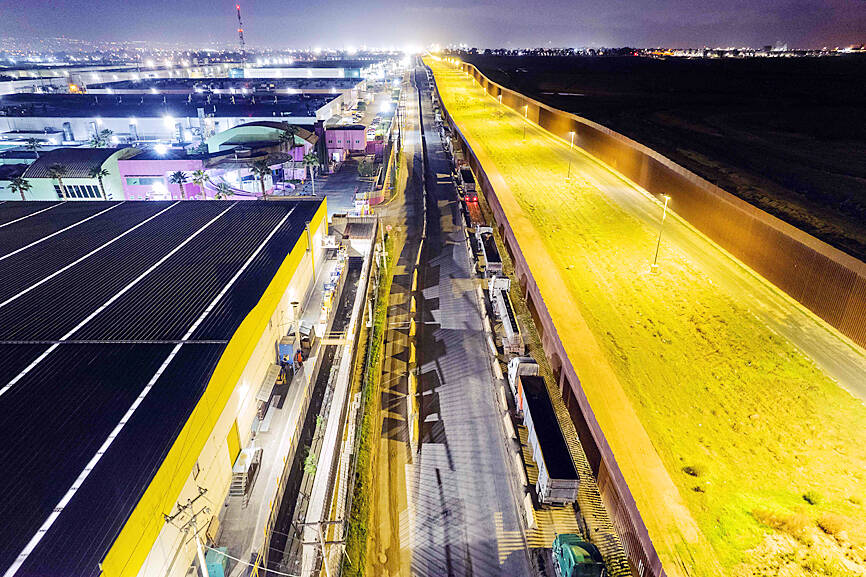Mounting trade wars between the US and its largest economic partners yesterday deepened as US tariffs on Canada, Mexico and China took effect, sparking swift retaliation from Beijing and Ottawa.
Stinging US tariffs on Canadian and Mexican goods came into effect as a deadline to avert US President Donald Trump’s levies passed without the nations striking a deal — a move set to snarl supply chains.
Trade war fears sent markets falling in Asia and Europe in response to what analysts said were its steepest tariffs on imports since the 1940s.

Photo: AFP
Trump had announced — and then paused — the blanket 25 percent tariffs on imports from major trading partners Canada and Mexico last month, accusing them of failing to stop illegal immigration and drug trafficking.
In pushing ahead with the duties, Trump cited a lack of progress in tackling the flow of drugs like fentanyl into the US.
The duties stand to impact more than US$918 billion of US imports from both countries.
The sweeping duties on Canada and Mexico are set to hamper supply chains for key sectors like automobiles and construction materials, risking cost increases to households.
Mexico supplied 63 percent of US vegetable imports and nearly half of US fruit and nut imports in 2023, US Department of Agriculture data showed..
Truck drivers at the Otay Mesa border crossing in Mexico said they were already feeling the impact of the tariffs as they lined up to cross into the US yesterday morning.
Work was drying up, because many companies in the Mexican border city of Tijuana export Chinese goods, driver Angel Cervantes said.
“And since the tariffs are also against China, work is going down for the [transport] companies,” he added.
The US also imports construction materials from Canada, meaning tariffs could drive up housing costs.
More than 70 percent of imports of two key materials homebuilders need — softwood lumber and gypsum — come from Canada and Mexico, National Association of Home Builders chairman Carl Harris said.
Trump on Monday also inked an order to increase a previously imposed 10 percent tariff on China to 20 percent — piling atop existing levies on various Chinese goods.
Beijing condemned the “unilateral imposition of tariffs by the US” and swiftly retaliated, saying it would impose 10 and 15 percent levies on a range of agricultural imports from the US.
China’s tariffs are to take effect next week and would impact tens of billions of US dollars in imports, from soybeans to chickens.
The Chinese Ministry of Foreign Affairs vowed to fight a US trade war to the “bitter end.”
“The Chinese people will not be intimidated,” ministry spokesman Lin Jian (林劍) said.
Canadian Prime Minister Justin Trudeau on Monday pledged to impose retaliatory 25 percent tariffs on Washington, saying in a statement: “Canada will not let this unjustified decision go unanswered.”
Mexican President Claudia Sheinbaum said her country has contingency plans.

US President Donald Trump yesterday announced sweeping "reciprocal tariffs" on US trading partners, including a 32 percent tax on goods from Taiwan that is set to take effect on Wednesday. At a Rose Garden event, Trump declared a 10 percent baseline tax on imports from all countries, with the White House saying it would take effect on Saturday. Countries with larger trade surpluses with the US would face higher duties beginning on Wednesday, including Taiwan (32 percent), China (34 percent), Japan (24 percent), South Korea (25 percent), Vietnam (46 percent) and Thailand (36 percent). Canada and Mexico, the two largest US trading

AIR SUPPORT: The Ministry of National Defense thanked the US for the delivery, adding that it was an indicator of the White House’s commitment to the Taiwan Relations Act Deputy Minister of National Defense Po Horng-huei (柏鴻輝) and Representative to the US Alexander Yui on Friday attended a delivery ceremony for the first of Taiwan’s long-awaited 66 F-16C/D Block 70 jets at a Lockheed Martin Corp factory in Greenville, South Carolina. “We are so proud to be the global home of the F-16 and to support Taiwan’s air defense capabilities,” US Representative William Timmons wrote on X, alongside a photograph of Taiwanese and US officials at the event. The F-16C/D Block 70 jets Taiwan ordered have the same capabilities as aircraft that had been upgraded to F-16Vs. The batch of Lockheed Martin

GRIDLOCK: The National Fire Agency’s Special Search and Rescue team is on standby to travel to the countries to help out with the rescue effort A powerful earthquake rocked Myanmar and neighboring Thailand yesterday, killing at least three people in Bangkok and burying dozens when a high-rise building under construction collapsed. Footage shared on social media from Myanmar’s second-largest city showed widespread destruction, raising fears that many were trapped under the rubble or killed. The magnitude 7.7 earthquake, with an epicenter near Mandalay in Myanmar, struck at midday and was followed by a strong magnitude 6.4 aftershock. The extent of death, injury and destruction — especially in Myanmar, which is embroiled in a civil war and where information is tightly controlled at the best of times —

China's military today said it began joint army, navy and rocket force exercises around Taiwan to "serve as a stern warning and powerful deterrent against Taiwanese independence," calling President William Lai (賴清德) a "parasite." The exercises come after Lai called Beijing a "foreign hostile force" last month. More than 10 Chinese military ships approached close to Taiwan's 24 nautical mile (44.4km) contiguous zone this morning and Taiwan sent its own warships to respond, two senior Taiwanese officials said. Taiwan has not yet detected any live fire by the Chinese military so far, one of the officials said. The drills took place after US Secretary